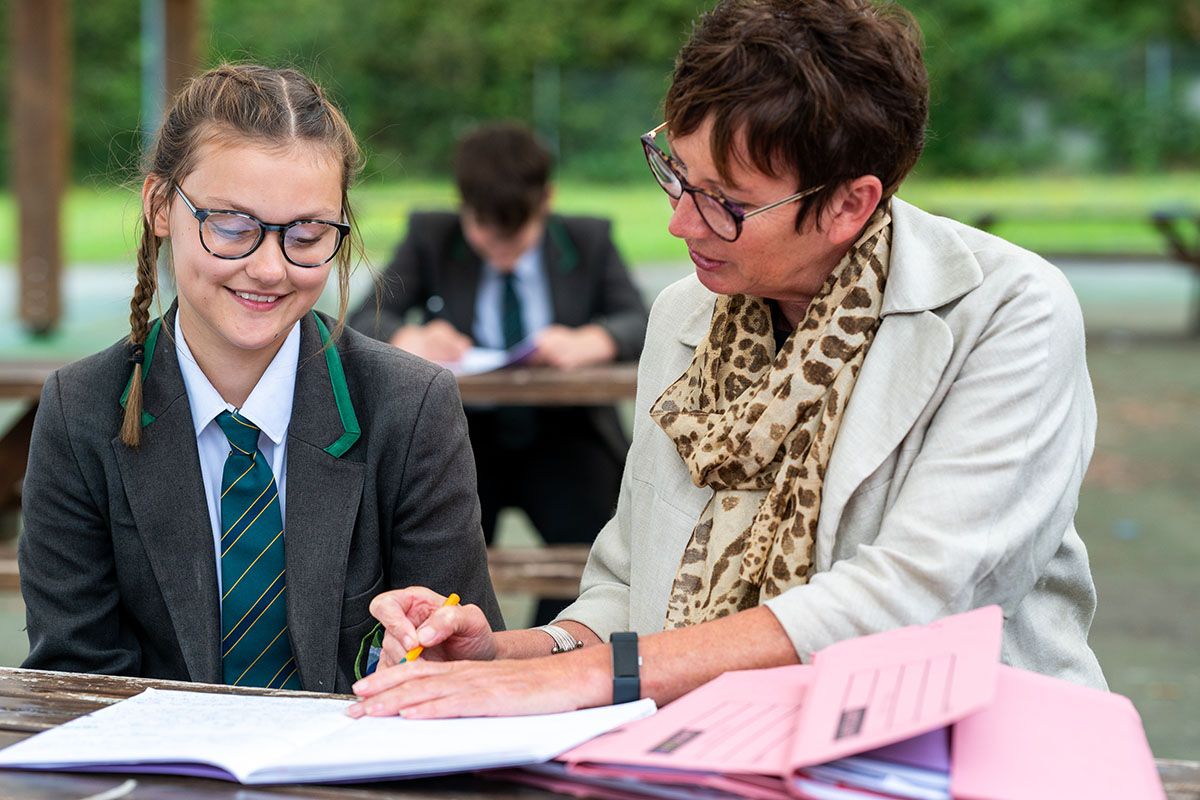English & Languages
English
Curriculum Overview
The overall aim of our English curriculum is to expose students to a wide range of texts to promote a love of reading and create students who are able to go out into the world, accessing it, having thoughts about it and being able to articulate it! Our curriculum aims to build resilience and encourage ambition and aspiration through the literature studied and the tasks embedded into the schemes of work. The analytical, evaluative and communication skills that students develop through the subject are invaluable future preparation for students in the wider world.
At Key Stage 3, we aim to transition Year 7 into their secondary school study by building on skills from year 6 and introducing new skills through texts studied. Our 3 year KS3 Curriculum aims to develop appreciation of reading through reading increasingly challenging texts as per the National Curriculum reading intent. It is also about exposing students to a range of themes and concepts which are fundamental to our GCSE texts as well as ensuring a wide range of texts are covered, particularly where the GCSE choice is so limited. At KS4, the curriculum aims to focus students on the exact skills needed for examinations drawing on the wealth of opportunities presented at KS3.
What do we expect students to get from English?
We expect students to get a love of language and reading from English, alongside personal skills such independence, resilience, perseverance and empathy, as well as skills in communicating both speaking and writing.
How does learning develop over the five years?
Year 7: In Year 7 students are taught to consider writer’s craft in a more advanced way than they would have in Primary school. The main concepts within the scheme are characterisation, themes, syntax, deeper inference and understanding of meaning.
Our transition unit includes the reading of mythology from around the world, as mythology not only opens the door to a world of fantasy, but also encompasses essential moral messages. The reading skills and assessments embedded in the transition unit are designed to consolidate those taught and tested at Primary school, which hold the most weighting: words in context, inference and retrieval. Building on from the transition scheme throughout their time in Year 7 students will: develop and strengthen their summary skills; consolidate their understanding of writing a coherent summary; embedding quotations, whilst showing inference and clear explanation. Students will also become more familiar with skills involved when reading and responding to prose, stepping up from comprehension to deeper inference and analysis, focusing on a wide range of diverse texts from Mythology from around the world, through to Shakespeare’s ‘The Tempest’. Students will have had little to no experience of playscripts and Shakespeare’s works, therefore It is important that students experience Shakespeare in KS3 and are confident in exploring and responding by the time they reach GCSE.
In addition to reading the year 7 schemes of work further build on oracy skills, and enhance vocabulary and writing skills learned in KS2.
Year 8:
The Year 8 schemes of work aim to further develop both reading and writing skills taught in Year 7 and introduce writer’s craft in a more advanced way. Students begin to further develop their inference and analysis skills, when reading a wide range of diverse and challenging text types. Through their time in year 8 students will focus on: building skills in writing- students will write an article where they will draw from and build on their learning from year 7, demonstrating their mastery of writing for a specific audience and purpose ; moving students from looking at whole meaning and inference skills in texts to identifying and analysing a range of authors’ deliberate method choices and their effect. Students will further develop their understanding of values and attitudes explored in a number of different extracts, from modern and 19th century texts.
Our Year 8 schemes not only bridge the way to building both writing and analytical skills in order to develop a deeper understanding of the language and techniques required at GCSE level, but also expose our students to a world and culture quite different from their own. They learn about different cultural ideals as well as exploring important themes of Justice/injustice, inequality and discrimination. .
Year 9:
This year marks the end of our students KS3 journey and a final chance to prepare for the rigours of formal GCSE Language and Literature teaching. By the end of this year, students will have been informally introduced to all reading skills required for GCSE and have completed the range of writing foci that underpins the writing required at GCSE. In September, students are introduced to the theme of gothic with a short film module (which also serves as a taster of A Level Film Studies) and then we study the popular text The Woman in Black. After Christmas, students consider ideas about fate, reading Romeo and Juliet. The year concludes with detective fiction and fittingly, a focus on endings. We look at the traditional Sherlock Holmes short story and the postmodern wounded investigator in The Curious Incident of the Dog in the Night-Time.
Year 10/11:
We teach the entire content required for GCSE Language and Literature during Year 10. Students are gradually introduced to exam questions so that they will have experienced all elements from all 4 exam papers by the end of the year. Our teaching of Literature determines the structure of the year – we begin with A Christmas Carol in the lead up to Christmas, the shorter and more modern An Inspector Calls follows the Christmas break and leads students into the more challenging play, Macbeth. Lastly we teach poetry which works efficiently around other student commitments during the summer term. Language teaching is linked into this structure and clearly signalled to students. Language analysis and creative writing is first encountered at the same time as the genius Charles Dickens, while the more complex comparison of non fiction writers’ perspectives is saved for the poetry module where students are required to compare perspectives of poets. The purpose of Year 11 is to consolidate, to revisit, to revise, to make cognitive links between characters, plot, themes and to practice, practice, practice exam answers.
How is the timetabled curriculum supplemented or enriched by other approaches to learning?
We offer targeted after school revision sessions for specific students in year 11, along with access to the library for further revision/homework support through copies of our texts, revision guides and electronic resources online. Students in all year groups benefit from theatre trips and access to the library during break, lunch and after school for homework support, computers and writing competitions. We offer bespoke off-timetable literacy weeks for some Year 7 students and run the Book Buzz scheme in which all year 7 students choose a book to keep.
Assessment for learning is ongoing in lessons, through questioning and retrieval, live teacher marking and other, alongside peer and self assessment. Our key assessment points throughout all three terms consist of both low and high stakes assessments. In order to identify progress, at specific points during each term students complete either a reading or writing assessment based on their learning and formative feedback is given.
How do we know if we have a successful curriculum?
We know that we have a successful curriculum because our students are engaged in lessons and they progress in their learning. When we talk to our students, they can tell us what they are learning and why, they can make links between the lesson and something they did last week, last month, last year, they can talk about themes and concepts accurately and with understanding.
How do we support ‘High Attaining’ pupils?
We support our high attaining students through high expectations, targeted questioning and the opportunities to practice higher order thinking. We teach to the top at scaffold so that students can achieve. We know our students and what they need, and we provide that through classwork and homework.
Languages
Curriculum Overview
“Language shapes the way we think, and determines what we can think about” – Benjamin Lee Whorf
“He who knows no foreign languages, knows nothing of his own” – Johann Wolfgang von Goethe
The intent of the MFL department, currently incorporating French, Spanish and Chinese across the Federation, is that all our language learners aspire to belong to a multicultural and mutually respectful society. We seek to ensure that all our students acquire the educational and cultural capital to which all young people are entitled. It is our intent to ensure that our curriculum, is informed by leading research and is both challenging and inspiring for all students. Our students build their skills, knowledge and understanding from units of sound, up to words, sentences and paragraphs with the aim of becoming competent and confident linguists.
What do we expect students to get from Languages?
We want our pupils to have a love of languages and an openness to other cultures and to ensure they realise the plethora of possibilities and opportunities that studying foreign languages can bring. Students will build resilience, communication and problem-solving skills that will be easily transferable to other curriculum areas as well as the world of work.
How does learning develop over the five years?
Year 7: Myself, My Life & My Home
The Year 7 MFL curriculum is evolving to meet national best practice, led by NCELP (National Centre for Excellence in Languages Pedagogy) with a clear focus on key phonics – the building blocks of words – so that students can move efficiently onto building words and sentences and increase their involvement in communication about themselves, their school, where they live, their home, their free time and food and drink. They will be able to give and understand opinions about a range of these topics and they will have built up knowledge and understanding of approximately 360 out of the 2000 most commonly used words that a native speaker uses.
Year 8: Having fun: Future Travel and Job Opportunities
The Year 8 MFL curriculum is evolving to meet national best practice, led by NCELP (National Centre for Excellence in Languages Pedagogy). The current Year 8 will be the first students to sit the new MFL GCSE which has a sharper focus on phonics and grammar. Sound to Letter (Phoneme-Grapheme) relationships will become increasingly embedded and regularly practised and weekly vocabulary learning will take place. They will be able to give longer responses and understand a range of opinions and explanations about holidays, for example specific links to Paris and other francophone cities and places of interest and consider local cultures and customs/festivals. Also covered will be the world of cinema, music and film and job opportunities. The Perfect Tense will also be covered through these topics and they will have built up knowledge and understanding of approximately 720 out of the 2000 most commonly used words that a native speaker uses.
Year 9: Health and Well-being: Food and Fitness, Habits and History
The current Year 9 are the last year to study the current GCSE syllabus and so developing competence and confidence in the key skills of listening, reading, writing and speaking will be a clear focus to equip those who choose it as a GCSE option with the tools they need to make progress at the next level. For those who don’t choose an MFL at GCSE, there are many cross-curricular links with the Year 9 curriculum and the PSHE curriculum, including topics like: food and drink, what different foods to to our bodies, illness, advice for leading healthier lives, childhood obesity, where different food comes from (how and why), alcohol and smoking, bad habits, sports and physical fitness, extreme sports, sleep, stress, as well as functional language that can be used on holiday for buying food and talking about money. The Year 9 KS3 course finishes with a unit to increase the cultural capital of our students. In French , for example , five key historical events are considered, from the immigration wave at the end of WW2 to the modern day “Gilets Jaunes” protests.
Year 10/11:
The key aims of the year 10 and 11 MFL curriculum are to build a confident and balanced skills set between all four disciplines; listening, speaking, reading and writing whilst exposing students to different cultures and trends and preparing them for the final exams and beyond. Theme The first year at KS4 is mainly focused on Themes One (Identity and Culture) and Theme Two ( Local, National, International and Global Areas of Interest) with Theme Three studied in Year 11 along with practice questions and examination technique. The broad aim is to build students knowledge, skills and understanding so they become confident and competent linguists by the end of the course. By this stage, they will have required not only the vocabulary and structures to achieve the highest possible marks in both the Foundation (up to Level 5) and the Higher Tier papers (up to Level 9), but thanks to the additional resources we supply – a foreign language assistant for all MFL subjects taught (French, Spanish and Chinese) and a variety of stretch and challenge clubs and holiday workshops, our students are able to build a host of transferable skills to use in other subjects and beyond, in the world of work. Resilience, problem-solving, memorising, communication, group work skills and collaboration. listening and wider literacy skills help to make our language students highly desirable for future employers. By the end of the course, students will be able to build their spoken and written responses up from simple answers, to developing more extended pieces with opinions and explanations through to answers packed with initiative and sophisticated flair, using complex structures and idiom to impress and achieve at the highest level.
How is the timetabled curriculum supplemented or enriched by other approaches to learning?
Our pedagogy and timetabled curriculum is underpinned by the four skill areas; listening focussing on pronunciation, phonetics and repetition along with the use of target language extracts/activities, reading focussing on key vocabulary and introducing strategies i.e. cognates and false friends which while enable our students to develop spontaneity and independence in their learning, speaking focussing again on pronunciation, phonetics, vocab learning and grammatical structures which helps to boost confidence in speaking the target language and writing focussing on description, explanation and opinions.
The regular use of live modelling and exemplar answers to demonstrate processes, standards and expectations.
A range of strategies to deepen knowledge so that it is committed to long term memory· i.e. quizlet, duo lingo, vocab builders.
The importance of giving students regular opportunities to improve work through written feed back and self and peer correction also helping students to understand what they are doing well and how they need to improve.
Students will develop new skills through studying a variety of interesting topics to foster enjoyment such as sport, free time and holiday.
We will enrich our curriculum by establishing cross-curricular links and providing on and off-site subject or topic related experiences when possible. The school runs trips to France and Spain and has previously offered students the opportunity of an extended period of time spent exploring China, increasing confidence, experiencing the culture while also developing Mandarin proficiency. We aim to improve their spiritual, social, moral and cultural understanding by ensuring pupils study a diverse curriculum which covers, different traditions, cultures and reflects a modern world.
What forms do assessments take? What is the purpose of assessment?
Assessment is ongoing, taking in classwork and homework marks. Formal assessments are conducted at points in the year, set out in the school calendar. Assessments allow teachers and students to see progress made and to inform next steps. Key Stage 4 assessments are based around GCSE Past Paper Tasks. All 4 Skill Areas (L,S,R,W) are assessed over the course of each year.
How do we know if we have a successful curriculum?
We have a successful curriculum when engagement in lessons across both key stages is good. Monitoring of rewards and positive on call gives a good indication of success and enjoyment. Increased uptake of MFL when students have to make their choices in year 9 is a clear indication of a successful curriculum. Assessment data reflecting good progress.
How do we support ‘High Attaining’ pupils?
We are one of a few schools which employ a foreign language assistant for French, Spanish and Chinese. Language assistants work individually with students as well as with small groups, working on pronunciation and fluency as well as enlightening our students on cultural issues and trends they wouldn’t be aware of. Stretch and challenge clubs for languages are available where students look at both exam questions and wider-texts/ debates beyond what is needed or taught for exams. These clubs are offered at KS3, KS4 and KS5 each week and students who regularly attend these clubs go on to achieve amongst the highest results in the country (Level 8/9s at KS4 and A/A* at A Level). Adaptive teaching is commonplace in our MFL classrooms – it has to be given the varied nature of the experiences in MFL our students have had before joining us. Sixth form MFL Students will often join our younger KS3/4 students in their lessons and work with the more able on speaking and listening work as well as supporting the less able to be more resilient and extend their writing beyond the minimum. Students across the year groups are offered the annual opportunity to attend Mandarin study days at the BFI in London, where they are encouraged to tackle and use higher tier vocabulary while analysing and discussing Chinese films. Not only does this help them to understand cultural differences and develop critical analytical skills, but also making seemingly more complex words and grammatical structures accessible. We have sent students to workshops at Portsmouth University designed for ‘gifted and talented linguists’ and will continue to take these opportunities in the future.




